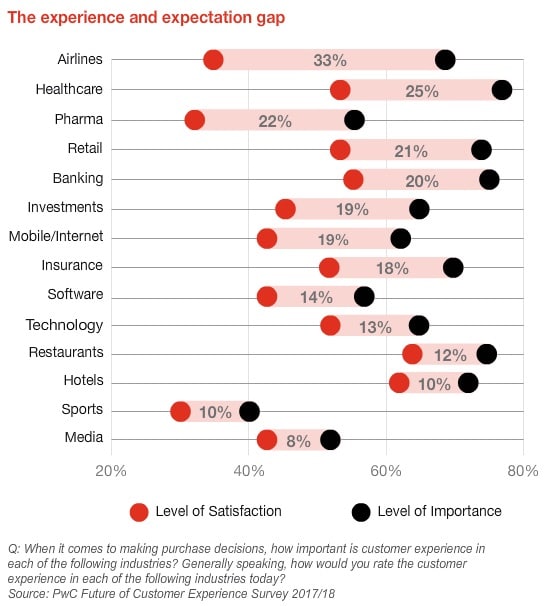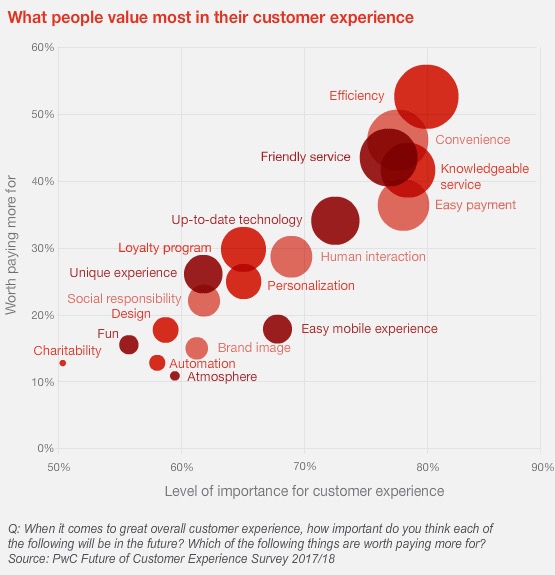A good customer experience is a top priority for consumers, and they will pay extra for it, yet more than half of consumers believe most brands in the market fall short, according to a new study.
A report based on interviews with consumers worldwide shows customers will pay up to 16% for great customer experience, depending on the product, and customers are more loyal to the brand and more willing to try its new product after a positive experience. But the survey by PwC, also shows that one in three say they will walk away from a brand they love after just one bad experience, said PWC Global Chief Experience Officer David Clarke.
“Customer experience is everything. Get that wrong and you’ll lose customers,” said Clarke. “What’s more, there is a real return to investing in experience.” He spoke to Velocitize about some of the study’s findings and lessons for marketers.
Velocitize: Let’s talk about the experience gap; 54% of U.S. consumers told you customer experience at most companies needs work. Why does this disconnect persist between customer experience and expectations? Are marketers guilty of overpromising or do consumers expect too much?
Clarke: Consumers point to speed, convenience, knowledgeable help and friendly service as the most important elements of a positive customer experience. Those don’t seem extravagant, but only 49% say companies provide a good customer experience today.
I think sometimes brands put too much emphasis on flashy things like gadgetry, and forget about the basics. Sometimes, just having an employee smile and greet you, or an automated service that immediately understands your voice command can make the difference between a mediocre or pleasant experience.
Where is the big expectation gap—is it a human factor or automation? What can be done?
Clarke: Companies are eager to implement technology to gain efficiency of automation. But eliminating humans from customer interactions only hurts the bottom line if the technology doesn’t deliver on factors like speed and convenience. And, if something does go wrong, customers don’t want to resolve it with a robot, they’d prefer to talk to a person.
To bridge the experience gap, invest in your employees. Sixty-six percent of people in our Customer Experience Report said employees have a significant impact on their experience. Training your employees is the first and most important step to delivering top-notch customer experience.
When it comes to human vs. automated customer service, 80% of U.S. consumers and 74% outside the U.S. want human interaction. But most say the staff help is subpar; only 38% of U.S. consumers and 46% outside the U.S. say the employees they interact with understand their needs. Can automation help?
Clarke: Technology that complements the human elements of customer experience without creating new frustrations is a great place to focus efforts. Automation is also helpful in freeing up employees from administrative tasks, allowing them to focus more on the customer and their needs.
Empower your employees, and arm them with the skills and freedom to help customers in meaningful, unscripted ways. Often, no one knows the customer better than the frontline employee.
Is customer experience the new marketing? Is UX where marketing needs to spend its time and less in messaging brand attributes?
Clarke: Customer experience isn’t really the new marketing. Many people have heard the saying, “the best advertisement is a customer referral.” The concept isn’t new, and it has nothing to do with marketing. It’s marketing’s job to make sure people learn about the experience and build a desire to get people in the door, but it’s the businesses’ job to keep people in the door and create those experiences.
Sixty-five percent of customers in our Customer Experience Report found a positive experience with a brand to be more influential than great advertising. Companies maintain marketing, sales and advertising budgets, but less often budget exclusively for customer experience. But having a customer experience budget would require cooperation across the company, because the customer experience is built throughout many of the elements that run the business.
Overall, do brands still matter, or are they only a marker of the service and experience consumers can expect?
Clarke: People judge and value brands on the experience they provide. Brand still matter, but those that transcend the services and products they offer to provide an exceptional experience will gain loyal customers and greater returns.







Join the conversation